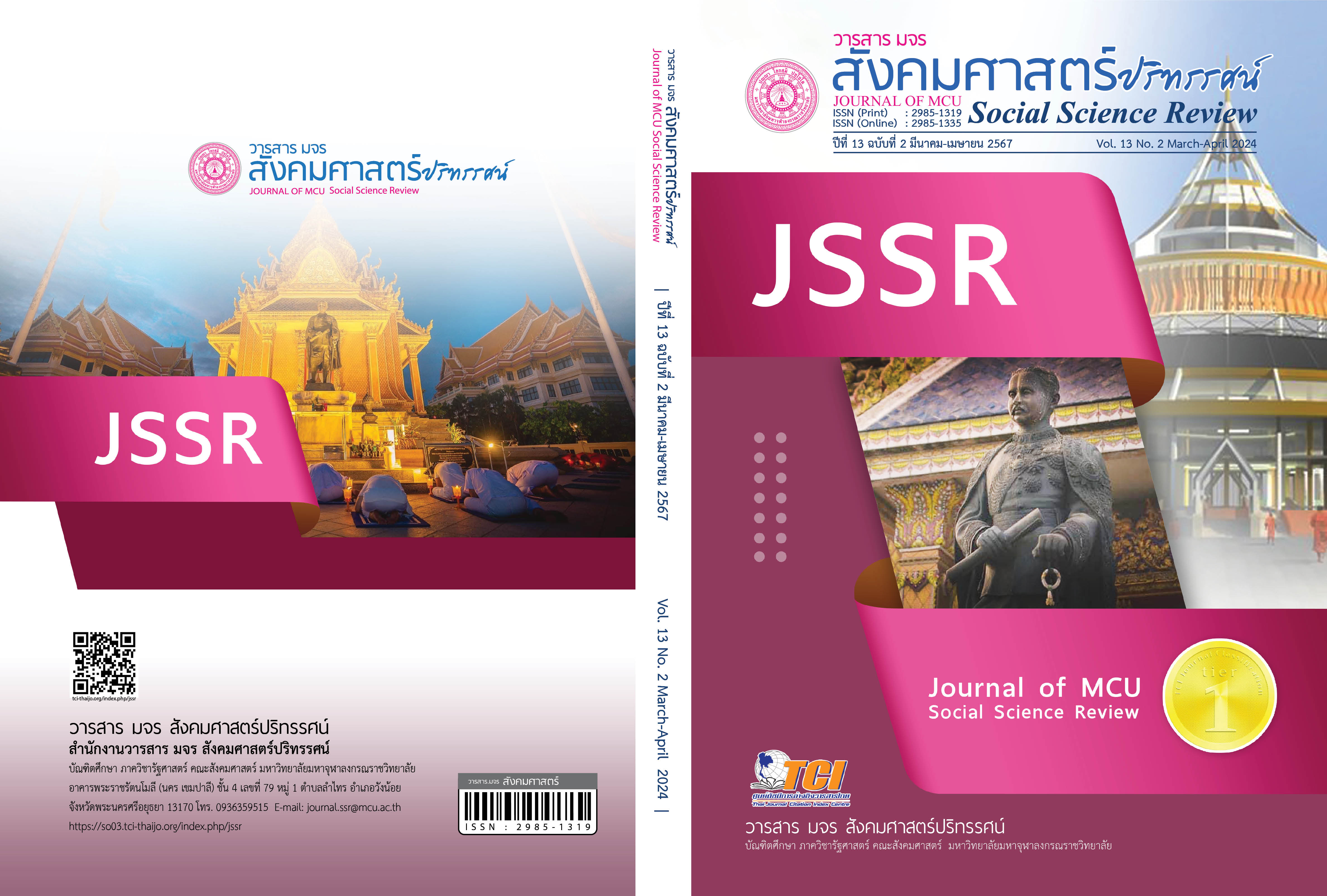การพัฒนาหลักสูตรการจัดประสบการณ์การเรียนรู้โดยใช้ปัญหาเป็นฐาน เพื่อส่งเสริมความสามารถในการแก้ปัญหาของเด็กปฐมวัย ระดับชั้นอนุบาลปีที่ 2
คำสำคัญ:
การพัฒนาหลักสูตร, การเรียนรู้โดยใช้ปัญหาเป็นฐาน, ความสามารถในการแก้ปัญหาของเด็กปฐมวัยบทคัดย่อ
บทความวิจัยนี้มีวัตถุประสงค์ 1. เพื่อสร้างและหาประสิทธิภาพของหลักสูตรฯ และ 2. เพื่อศึกษาผลการใช้หลักสูตรฯ ซึ่งเป็นการวิจัยแบบกึ่งทดลอง กลุ่มตัวอย่างที่ใช้ในการวิจัย คือ เด็กปฐมวัยอายุระหว่าง 4-5 ปี ที่กำลังศึกษาอยู่ในระดับชั้นอนุบาลปีที่ 2 ภาคเรียนที่ 2 ปีการศึกษา 2564 โรงเรียนบ้านแม่เทย จำนวน 30 คน จากการสุ่มแบบกลุ่ม เครื่องมือที่ใช้ในการวิจัย ได้แก่ 1. หลักสูตรฯ 2. คู่มือการใช้หลักสูตรฯ และ 3. แบบสังเกตพฤติกรรมความสามารถในการแก้ปัญหาของเด็กปฐมวัย จำนวน 9 ข้อ วิเคราะห์ข้อมูลโดยการหาค่าร้อยละ ค่าเฉลี่ย การหาประสิทธิภาพ (E1/E2) ส่วนเบี่ยงเบนมาตรฐาน และ t – test dependent samples
ผลการวิจัยพบว่า 1. การสร้างและหาประสิทธิภาพของหลักสูตรฯ มีค่าเฉลี่ยความเหมาะสมอยู่ในระดับมาก คู่มือการใช้หลักสูตรฯ มีค่าเฉลี่ยความเหมาะสมอยู่ในระดับมาก ผลการหาประสิทธิภาพของหลักสูตรฯ มีค่าประสิทธิภาพเท่ากับ 80.85/82.72 ซึ่งสูงกว่าเกณฑ์มาตรฐาน 80/80 ที่กำหนดไว้ 2. การศึกษาผลการใช้หลักสูตรฯ พบว่าเด็กปฐมวัยที่ผ่านการเรียนรู้ตามหลักสูตรฯ มีความสามารถในการแก้ปัญหาของเด็กปฐมวัยหลังการทดลองสูงกว่าก่อนการทดลองอย่างมีนัยสำคัญทางสถิติที่ระดับ .05 ซึ่งเป็นไปตามสมมุติฐานที่ตั้งไว้
เอกสารอ้างอิง
ทิศนา แขมมณี. (2547). ศาสตร์การสอนองค์ความรู้เพื่อการจัดกระบวนการเรียนรู้ที่มี ประสิทธิภาพ. กรุงเทพฯ: จุฬาลงกรณ์มหาวิทยาลัย.
นูรียะห์ เจะอุบง. (2557). การพัฒนาหลักสูตรอิสลามศึกษาระดับปฐมวัย โรงเรียนชุมชนบ้านปูยุด อำเภอเมือง จังหวัดปัตตานี (ครุศาสตรมหาบัณฑิต สาขาวิชาการสอนอิสลามศึกษา). ยะลา: มหาวิทยาลัยราชภัฎยะลา.
พัชรินทร์ สิทธิตัน และเกษทิพย์ ศิริชัยศิลป์ (2564). การพัฒนาหลักสูตรส่งเสริมทักษะการคิดเพื่อชีวิตที่สำเร็จโดยใช้การจัดประสบการณ์แบบโครงการสำหรับเด็กปฐมวัยของโรงเรียนขยายโอกาส สังกัดสำนักงานเขตพื้นที่การศึกษาประถมศึกษาลำพูน เขต 2. วารสารมหาวิทยาลัยมหามกุฏราชวิทยาลัย วิทยาเขตร้อยเอ็ด, 10(2), 827-840.
พันทิวา กุมภิโร. (2560). การพัฒนาหลักสูตรเสริมตามแนวคิดการเรียนรู้แบบอิงบริบทโดยใช้ปัญหาเป็นฐานเพื่อเสริมสร้างทักษะและกระบวนการทางคณิตศาสตร์สำหรับนักเรียนชั้นประถมศึกษาปีที่ 6 (ดุษฎีบัณฑิตนิพนธ์การศึกษาดุษฎีบัณฑิต สาขาวิชาวิจัยหลักสูตรและการสอน). สกลนคร: มหาวิทยาลัยราชภัฏสกลนคร.
ศิริมงคล ทนทอง (2553). การพัฒนาหลักสูตรภูมิปัญญาท้องถิ่นสุรินทร์สำหรับเด็กปฐมวัย (ดุษฎีบัณฑิตนิพนธ์การศึกษาดุษฎีบัณฑิต สาขาวิชาการศึกษาปฐมวัย). กรุงเทพฯ: มหาวิทยาลัยศรีนครินทรวิโรฒ.
สำนักงานรับรองมาตรฐานและประเมินคุณภาพการศึกษา. (2563). รายงานการประเมินคุณภาพ ภายนอกรอบสี่ พ.ศ. 2559-2563 การศึกษาปฐมวัยและระดับการศึกษาขั้นพื้นฐานโรงเรียนบ้านแม่เทย. กรุงเทพฯ: สำนักงานรับรองมาตรฐานและประเมินคุณภาพ การศึกษา.
สำนักงานเลขาธิการสภาการศึกษา. (2561). แนวแนะวิธีการเลี้ยงดู ดูแล และพัฒนาเด็กปฐมวัยตามสมรรถนะเพื่อคุณภาพเด็กตามวัย 0-5 ปี. กรุงเทพฯ: พริกหวาน กราฟฟิค.
_____. (2562). แนวทางการพัฒนาสมรรถนะผู้เรียนระดับการศึกษาขั้นพื้นฐาน. กรุงเทพฯ: บริษัท 21 เซ็นจูรี่ จำกัด.
สุดา กูเล็ม. (2554). การพัฒนารูปแบบการจัดประสบการณ์การเรียนรู้แบบใช้ปัญหาเป็นหลักเพื่อพัฒนาความสามารถในการแก้ปัญหาของเด็กปฐมวัย (วิทยานิพนธ์ศึกษามหาบัณฑิต สาขาวิชาการวิจัยและประเมิน). สงขลา: มหาวิทยาลัยทักษิณ.
สุรเดช พรมคํา และคณะ. (2559). การพัฒนาบทเรียนคอมพิวเตอร์ช่วยสอนมัลติมีเดียเพื่อ เสริมสร้างทักษะการคิดรวบยอดทางคณิตศาสตร์ เรื่องจำนวนนับของนักเรียนระดับชั้นอนุบาล 3. สืบค้น 20 มีนาคม 2565, จาก https://shorturl.asia/52Cvk
Taba, H. (1962). Curriculum Development: Theory and Practice. New York: Harcourt Brace & world
ดาวน์โหลด
เผยแพร่แล้ว
รูปแบบการอ้างอิง
ฉบับ
ประเภทบทความ
สัญญาอนุญาต
ลิขสิทธิ์ (c) 2024 วารสาร มจร สังคมศาสตร์ปริทรรศน์

อนุญาตภายใต้เงื่อนไข Creative Commons Attribution-NonCommercial-NoDerivatives 4.0 International License.
เพื่อให้เป็นไปตามกฎหมายลิขสิทธิ์ ผู้นิพนธ์ทุกท่านต้องลงลายมือชื่อในแบบฟอร์มใบมอบลิขสิทธิ์บทความให้แก่วารสารฯ พร้อมกับบทความต้นฉบับที่ได้แก้ไขครั้งสุดท้าย นอกจากนี้ ผู้นิพนธ์ทุกท่านต้องยืนยันว่าบทความต้นฉบับที่ส่งมาตีพิมพ์นั้น ได้ส่งมาตีพิมพ์เฉพาะในวารสาร มจร สังคมศาสตร์ปริทรรศน์ เพียงแห่งเดียวเท่านั้น หากมีการใช้ภาพหรือตารางหรือเนื้อหาอื่นๆ ของผู้นิพนธ์อื่นที่ปรากฏในสิ่งตีพิมพ์อื่นมาแล้ว ผู้นิพนธ์ต้องขออนุญาตเจ้าของลิขสิทธิ์ก่อน พร้อมทั้งแสดงหนังสือที่ได้รับการยินยอมต่อบรรณาธิการ ก่อนที่บทความจะได้รับการตีพิมพ์ หากไม่เป็นไปตามข้อกำหนดเบื้องต้น ทางวารสารจะถอดบทความของท่านออกโดยไม่มีข้อยกเว้นใดๆ ทั้งสิ้น





